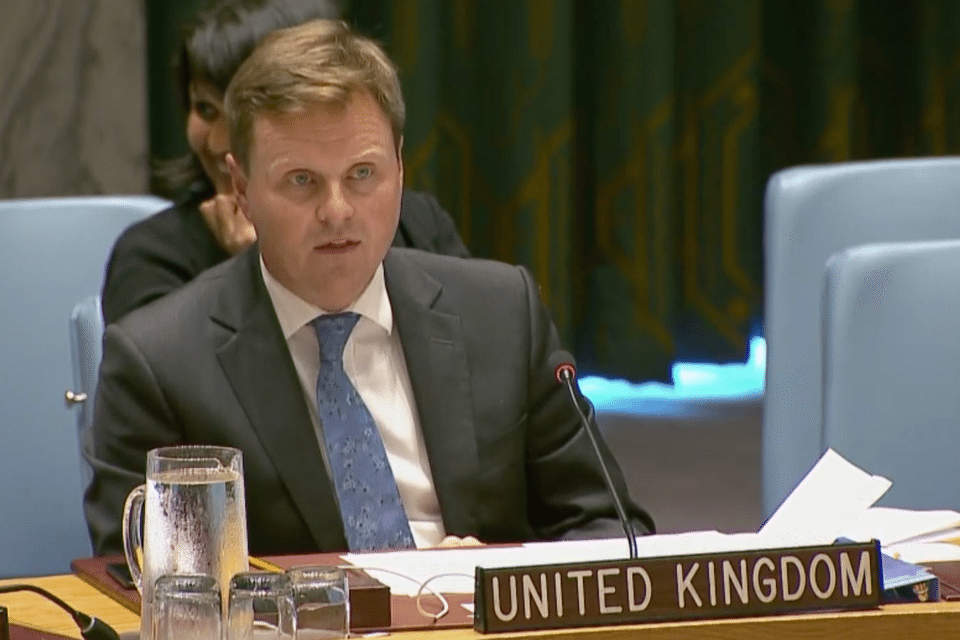African Union is a crucial partner for the United Nations
Statement by Stephen Hickey, UK Political Coordinator to the UN Security Council on cooperation between the United Nations and African Union.

Thank you Madam President.
Let me begin by thanking Commissioner Chergui for his briefing and for the African Union’s work to bring peace and security to Africa. I would also like to welcome SRSG Zewde to her new role, to thank her for her briefing and for the SG’s reports and her efforts and the efforts of her office to the African Union. Thank you very much.
I would also like to join other speakers, Bolivia, Sweden and others who have taken this opportunity to pay tribute to the remarkable efforts of Ethiopia and Eritrea in recent weeks in advancing peace and stability between those two countries. This is really positive news for the region, for the African Union and for this Council.
Madam President, the United Kingdom believes the African Union is a crucial partner for the United Nations across many different strands of work, including peace and security. The AU’s deep understanding of the issues that the continent is facing makes it uniquely placed to lead efforts in this area. The United Kingdom strongly welcomes the intention for the African Union and United Nations to coordinate more on peace and security, including on conflict prevention and peacekeeping matters. Combining the knowledge and skills from both organisations will mean resources can be deployed more effectively and efficiently.
As set out in the Secretary General’s report, Regional Economic Communities such as ECOWAS and IGAD have positively contributed to peace and security in the region and as such must be considered as part of the AU’s reform process. To ensure resources are coordinated effectively, we agree that the AU must retain oversight over these Regional Economic Communities.
Madam President, the UK believes that the AU’s Peace Support Operations can play a crucial role in achieving long-term peace, and therefore it is important that the long-term financial sustainability and predictability of current and future missions are considered so that they can keep doing their good work. As Commissioner Chergui has already highlighted today, Security Council resolutions 2320 and 2378 outline the principles of UN-assessed funding for AU-led Peace Support Operations. Resolution 2320 agreed that cooperation between the AU and the UN on Peace Support Operations is key to delivering and maintaining peace in Africa. As set out in the resolution, we look forward to progress towards a UN-AU decision-making process that respects Security Council primacy on mandating and deploying missions.
We support the AU’s efforts to ensure robust standards, which are comparable to the UN’s and are adhered to across the organisation. In this regard, we welcome the close work between the UN Secretariat and the AU Commission on compliance frameworks and that a Conduct and Discipline Policy and a Sexual Exploitation and Abuse Policy have been agreed. We eagerly await completion of the accountability and oversight frameworks, so that we can move forward in considering the use of UN-assessed contributions to part-fund AU-led Peace Support Operations on a case-by-case basis. In that regard, we warmly welcome the AU’s commitment to fund 25% of Peace Support Operations costs by 2020, and I also welcome the detail set out by Commissioner Chergui earlier in this meeting.
In particular, on AMISOM, we note the report of the Secretary-General’s Special Envoys on AU financing, on future financing and the recommendation for the AU to lead on funding and for non-traditional donors to contribute. As the report concluded, UN Assessed Contributions are not an option in the short term. Therefore, we need to see the international community step up and provide vital contributions to AMISOM in the short to medium term.
Madam President, the United Kingdom warmly welcomes the cooperation between the African Union and the UN, as demonstrated by the joint field visits between the UN Secretary-General, Chairperson Faki and others. We encourage more joint UN-AU field visits, as well as increased coordination between UN SRSGs and AU Special Envoys – particularly ahead of decision points on mandates or sanctions regimes and ahead of the issuing of reports. The African Union’s knowledge of the region is invaluable. With this in mind, we encourage more interaction between this Council and the AU’s Peace and Security Council, including on reporting, so we can consider the views of the African Union.
Madam President, the challenges Africa faces remain significant. Only last year, 15,000 people were displaced every day, 75% due to conflict. We must work together to ensure our efforts are complementary so we maximise the impact they can have to give us the best chance to address the enormous challenge of achieving peace and security in Africa and in silencing the guns.